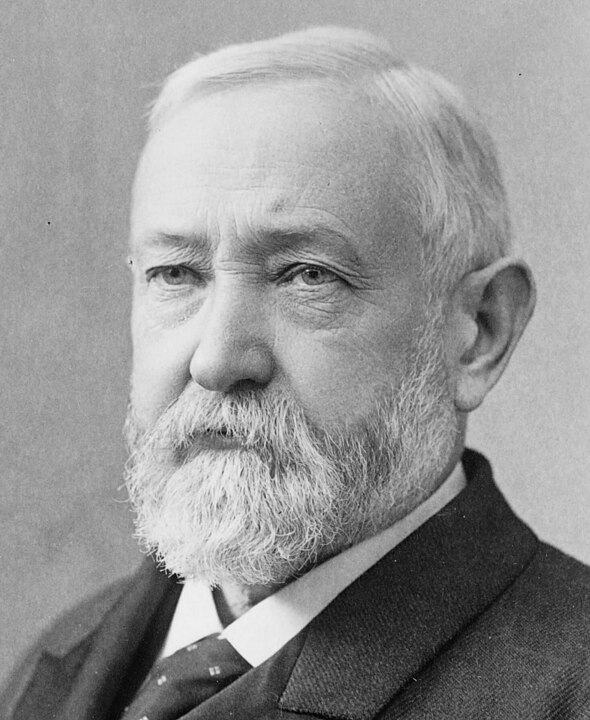Benjamin Harrison followed his grandfather William Henry Harrison’s notable example all the way to the White House, when he became the 23rd president of the United States in 1888. He was born on August 20, 1833 in North Bend, Ohio to Elizabeth Ramsay Irvin and John Scot Harrison. He was their second among their ten children.
Benjamin grew up in a prominent family that included the congressman, who is his father and the president’s grandson. When he was seven years old, his grandfather became president; however, he died in 1840 due to pneumonia a month after he became the president. He did not grow up wealthy in spite of his famous family, but on a farm where he spent most of his childhood outdoors fishing and hunting. He also enjoyed reading in his grandfather’s library since he was raised in his estate.
He was taught in a local one-room schoolhouse, soon, his parents arranged a private tutor to prepare him for college. When he was fourteen years old, he entered the Farmer’s College in Ohio with his older brother, Irwin; however, he transferred Ohio’s Miami University, and graduated in 1852 with distinction. He moved with his wife Caroline Lavinia Scott to Indianapolis, Indiana on October 20, 1853. After graduating, he passed the bar exam and became a lawyer. Benjamin and Caroline had two children: Russell Benjamin and Mary.
As he started practicing law in Indianapolis with William Wallace. Indianapolis became an inviting ground for him to pursue his political ambition. Benjamin’s father warned him about the pressure and demands of engaging in politics. He even joined the newly formed Republican Party in 1856; however, war disrupted his political dreams. As a soldier, Benjamin Harrison joined the Union Army, participating in the Atlanta Campaign of William Tecumseh Sherman. He had achieved the rank of brigadier general by the end of the war. Also, Benjamin Harrison was the last president to serve as a Civil War general.
After the Civil war in 1864, Benjamin Harrison was elected as the reporter of the Indiana Supreme Court once again for four more years, even if he does not seek the said position. During the term of Ulysses S. Grant in 1869, he was appointed him to represent the federal government on a civil case against Lambdin P. Milligan for his sensational wartime treason. His victory in winning the jury’s decision to Miligan’s favor increased his reputation as a lawyer that is why the Republicans from Indiana urged him to run for Congress.
Benjamin Harrison ran for the Republican nomination for Indiana Governor in 1872. His rival, Thomas M. Browne, was preferred by former Governor Oliver Morton, and Harrison lost his bid for statewide office. He returned to his law practice and was financially prosperous enough to construct a great new home in Indianapolis in 1874, despite the panic of 1873. On behalf of Republican candidates and policies, Benjamin Harrison continued to make speeches. He became deeply associated with the Republican Party. He ran twice for Governor and one time for Senator, but was not elected.
Finally, in 1881, Benjamin Harrison was elected to the U.S. Senate. During the next six years, he served in the Senate until 1887. Benjamin Harrison disputed for the rights of homesteaders and Native Americans against the expanding railroad industry. He also campaigned for generous pensions for the Civil War veterans. As a man with a strong principles and belief, he broke with the Republican Party for opposing the Chinese Exclusion Act of 1882.
After a Democratic victory in the Indiana state legislature in 1887, Benjamin Harrison lost his Senate seat, only to secure the Republican nomination for president the following year. He gave several speeches to delegations that visited him in Indianapolis rather than traveling around the country during the campaign, an early example of so-called “front-porch campaigning.” By more than 90,000 votes, he had lost the popular vote, but managed to win the electoral vote and was elected over Grover Cleveland.
On March 4, 1889, Benjamin Harrison was inaugurated as the twenty-third president of the United States. During his administration, he was very proud of the foreign policy called the first Pan American Congress met which he assisted in shaping. It established an information center that later became the Pan American Union.
William McKinley of Ohio submitted, with the support of Benjamin Harrison, the highest protective tariff in the history of the nation. Known as the 1890 McKinley Tariff, the law raised rates by an average of 49.5 percent. This bill also handed the President enormous authority in the field of foreign trade.
On the other hand, Harrison lent his support to the Sherman Silver Purchase Act, which required the government to buy 4.5 million ounces of silver each month, and, by signing into law the Sherman Antitrust Act, intended to ban industrial combinations or trusts, he bowed to the pressure of farmers and reformers.
Aside from that, Benjamin Harrison’s administration successfully negotiated with Germany and Great Britain the terms for an American protectorate in the Samoan Islands. It also opposed the order of Canada and Great Britain to prevent overharvesting of seals in Bering Sea. He also submitted to the Senate a treaty to annex Hawaii at the end of his term; however, Grover Cleveland withdrew it.
He left the White House after struggling for reelection in 1892. He and his family returned to Indianapolis and continued his law practice. He also married Mary Lord Dimmick when he was 62 years old. Benjamin Harrison spent his retirement year as a dignified elder statesman. He spent his retirement delivering a series of lectures about constitutional law at Stanford University and served with energy and dedication as chief counsel for Venezuela in its boundary dispute with British Guiana.
He died of pneumonia on March 13, 1901 in Indianapolis, Indiana.
US Presidents | ||

